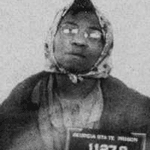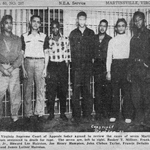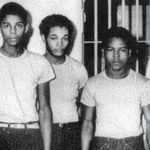
Innocence
Posthumous Declarations of Innocence
This is non-comprehensive list of individuals declared innocent after their deaths.
The “Martinsville 7” Receive Posthumous Pardons 70 Years After Their Executions in Virginia.

In 1949, seven young Black men were accused of the rape and beating of a white woman in Martinsville, Virginia. The seven — Francis DeSales Grayson, Frank Hairston Jr., Howard Hairston, James Luther Hairston, Joe Henry Hampton, Booker T. Millner, and John Clabon Taylor — were interrogated by police without the appointment of legal counsel. Under threats that they would be released to a lynch mob if they denied involvement, each confessed to participating in the rape. After a succession of perfunctory trials before all-white, all-male juries, each was convicted and sentenced to death. They were executed in 1951 in the largest mass execution for rape in U.S. history.
Following years of advocacy from family members and other advocates, the case gained renewed attention on the seventieth anniversary of the executions, as Virginia considered and then adopted a bill to abolish the state’s death penalty. The advocates continued to push for gubernatorial action, and Governor Ralph Northam announced the posthumous pardons on August 31, 2021, saying “This is about righting wrongs.” Northam’s pardons did not address the question of innocence, but, Northam said, “they serve as recognition from the Commonwealth that these men were tried without adequate due process and received a racially biased death sentence not similarly applied to white defendants.
The “Groveland Four” Posthumously Pardoned in Florida 70 Years After False Rape Accusation.

On January 11, 2019, the Florida Clemency Board unanimously granted posthumous pardons to the “Groveland Four,” four young African-American men falsely accused of raping a white teenager in Lake County, Florida in 1949.
Charles Greenlee, Ernest Thomas, Walter Irvin, and Samuel Shepherd were charged with raping 17-year-old Norma Padgett. Thomas escaped from custody but was hunted down and murdered by an angry mob. He was reportedly shot 400 times. White mobs burned and shot at the homes of black families, many of whom fled and never returned. Greenlee, Irvin, and Shepherd were beaten until they falsely confessed to the crime. All-white juries convicted them, sentencing World War II veterans Irvin and Shepherd (pictured, right) to death and Greenlee (pictured, left), who was only 16 years old, to life in prison.
Represented by Thurgood Marshall before the U.S. Supreme Court, Irvin’s and Shepherd’s convictions were unanimously overturned in 1951. Shortly after the reversal, Lake County Sheriff Willis V. McCall shot the two handcuffed men while he was driving them to a court appearance, and posed for a photo in front of their prone bodies. McCall claimed that he had acted in self-defense. Shepherd died. Irvin survived by playing dead until others arrived at the scene. He was retried and once again sentenced to death by an all-white jury but received a last-minute reprieve when the prosecutor expressed doubt as to his guilt. His sentence was then commuted to life in prison. Greenlee and Irvin were both eventually paroled, but Irvin died just one year after his release. Greenlee died in 2012.
South Carolina Pair Exonerated 94 Years After Execution — The South Carolina Department of Probation, Parole and Pardon Services voted 7 – 0 to pardon Thomas Griffin and Meeks Griffin for the 1913 murder of former Confederate Army veteran John Q . Lewis. The pair were executed in 1915 for the murder after another man, Monk Stephenson, plead guilty and received a life sentence in exchange for implicating the Griffins. “Stevenson later told a fellow inmate that he had implicated the Griffin brothers because he believed they were wealthy enough to pay for legal counsel, and as such would be acquitted,” said legal historian Paul Finkelman. Two others, Nelson Brice and John Crosby, were also executed for the crime. The pair were great uncles of nationally syndicated radio show host Tom Joyner. “It’s good for the community. It’s good for the nation. Anytime that you can repair racism in this country is a step forward,” Joyner said. (CNN.com, October 15, 2009).

Georgia Board to Pardon Woman 60 Years After Her Execution - The Georgia Board of Pardons and Paroles in August 2005 issued a formal pardon for Lena Baker (pictured), the only woman executed in the state during the 20th century. The document, signed by all five of the current board members, will note that the parole board’s 1945 decision to deny Baker clemency and allow her execution was “a grievous error, as this case called out for mercy.” Baker, an African American, was executed for the murder of Ernest Knight, a white man who hired her . Baker was tried, convicted, and sentenced to die in one day by an all-white, all-male jury. Baker claimed she shot Knight in self-defense after he locked her in his gristmill and threatened her with a metal pipe. The pardon notes that Baker “could have been charged with voluntary manslaughter, rather than murder, for the death of E.B. Knight.” The average sentence for voluntary manslaughter is 15 years in prison. Baker’s picture and her last words are currently displayed near the retired electric chair at a museum at Georgia State Prison in Reidsville. (Atlanta Journal-Constitution, August 16, 2005).
Suffolk District Attorney Posthumously Dismisses Charges Against Two Co-defendants in Mob-Related Murder — In 1968, Joseph Salvati, Peter Limone, Henry Tameleo, and Louis Greco were convicted of a 1965 murder of a Massachusetts-mob member. Mr. Limone, Mr. Tameleo, and Mr. Greco were sentenced to death by Massachusetts’ electric chair, but were spared in 1974 when Massachusetts abolished the death penalty and their sentences were commuted to life in prison. Mr. Salvati was sentenced to life in prison and was released in 1997, following a commutation of his sentence. Mr. Tameleo and Mr. Greco died in prison, in 1985 and 1995, respectively. At trial, the main witness against the four men was Joseph Barboza, a hit man cooperating with prosecutors, who later admitted that he had fabricated much of his testimony against the four men. In 2001, Mr. Limone’s conviction was overturned and the case against him was officially dropped, as a result of new evidence (Commonwealth v. Limone, 2001 Mass. Super. LEXIS 7 (2001)). FBI documents revealed that informants had told the FBI before the murder that the victim would be killed, and by whom, as well as a memorandum after the crime that listed the men involved. In 2004, the Suffolk District Attorney’s Office posthumously dismissed charges against Mr. Greco, citing the evidence used in Mr. Limone’s exoneration. Three years later, in 2007, the charges against Mr. Tameleo were also dropped.
(Find more information on Mr. Limone’s exoneration, here.)
Frank Lee Smith was convicted and sentenced to death in Florida in 1986 for the rape and murder of 8‑year-old Shandra Whitehead. Smith’s conviction was based primarily on three questionable witness identifications. The first witness identified Mr. Smith at trial “based on his shoulders,” while the second testified that he was “bothered” by the line up he was shown because Mr. Smith did not seem as tall as the man the witness remembered. The police assured him that everyone in the line-up was at least 6’ tall, but that was not true — Mr. Smith was 5’ 9” tall. The final witness testified that the man she had seen was not wearing glasses although Smith, who was legally blind, wore thick glasses.

Frank Lee Smith, Photo Courtesy of Innocence Project of Florida, Inc.
Mr. Smith consistently maintained his innocence, saying during the sentencing phase of his trial: “I didn’t do it…It really hurt me to be accused of something like this, when my mama was raped…and my mama was killed like that…How do you think I feel about a baby like that?” One witness later recanted her testimony and identification of Smith. In an affidavit, she said, “While I was in the courtroom telling about what I saw, I knew that the man on trial was too thin to be the same man I saw on the street.” When an investigator for Mr. Smith showed the witness a picture of a man named Eddie Mosley, she claimed she realized her mistake. “When I looked at the picture everything came back to me,” she said. “The man in the photo is without a doubt the man I saw. I know that he is not the same man who was on trial for the little girl’s murder. I am so sorry that the wrong man is in prison and sentenced to death. I had doubts in the courtroom, but I was under so much pressure. Also, the state attorney told me about how dangerous the man was and how he needed to be locked up forever.” Regardless of the affidavit, Mr. Smith’s conviction and sentence was affirmed in 1990.
Mr. Smith died on January 30, 2000, from pancreatic cancer. In July of 2000, Mr. Smith’s attorneys and the state reached an agreement to obtain DNA testing. On December 11, 2000, the lab reported that Mr. Smith’s DNA did not match the DNA evidence found at the crime scene. Four days later, the lab reported that the genetic material was consistent with Eddie Mosley’s DNA. Mr. Smith was posthumously exonerated on December 15, 2000.
(Find more information on Mr. Smith’s exoneration, here)
From Professor Michael Radelet, University of Colorado:
In Illinois in 1893, Governor Peter Altgeld pardoned three of the Haymarket defendants, six years after four of their co-defendants had been hanged. An eighth defendant had taken his own life on the eve of his scheduled execution. Altgeld issued the pardons because all eight “had been wrongfully convicted and were innocent of the crime .…” P. AVRICH, THE HAYMARKET TRAGEDY 423 (1984).
In Massachusetts in 1977 (on the 50th anniversary of their executions), Gov. Michael Dukakis apologized for the massive due process violations in the case of Sacco and Vanzetti.
In 1987, Nebraska Governor Bob Kerry pardoned William Jackson, who had been hanged exactly 100 years earlier in Beatrice for the murder of a man who later turned up alive.
In Maryland in 2001, Governor Paris Glendening issued a pardon to John Snowden, a Black man who was hanged in 1919 for the rape and murder of the wife of a prominent White businessman. Two key trial witnesses had recanted their testimony and before the hanging, eleven of the twelve jurors had pled for mercy.
In 2009, South Carolina pardoned two African-American men, Thomas and Meeks Griffin, who had been electrocuted in 1915 for murdering a white Confederate War veteran. They were convicted on the perjured testimony of the actual murderer, who falsely fingered the men to save himself from the executioner.